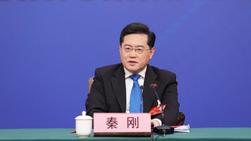 Chinese Foreign Minister Qin Gang speaks at a news conference on China's foreign policy and foreign relations on the sidelines of the first session of the 14th National People's Congress, March 7, 2023. (PHOTO / XINHUA)
Chinese Foreign Minister Qin Gang speaks at a news conference on China's foreign policy and foreign relations on the sidelines of the first session of the 14th National People's Congress, March 7, 2023. (PHOTO / XINHUA)
Beijing has highlighted the necessity to work on building mutual trust and managing differences with Manila as State Councilor and Foreign Minister Qin Gang kicked off his first visit in his current post to the Southeast Asian country on Friday.
The visit is being made at a time when Washington is attempting to make the Philippines party to China-US tensions over the Taiwan question and create trouble in the South China Sea by bolstering its military posture, officials and experts said.
Beijing voiced great concern after the United States and the Philippines announced plans on April 3 to expand their Enhanced Defense Cooperation Arrangement to include four new sites in the Philippines — a key move to bolster US military deployment in the region
Qin will visit the Philippines from Friday to Sunday at the invitation of Philippine Secretary of Foreign Affairs Enrique Manalo.
During the trip, he will visit leaders and prominent figures including Philippine President Ferdinand Romualdez Marcos Jr, and he will hold a meeting with the Philippine foreign secretary.
"China looks forward to strengthening communication, stepping up mutual trust, properly tackling divergences and deepening cooperation through this visit," Foreign Ministry spokesman Wang Wenbin said on Friday.
ALSO READ: Qin: Chinese modernization boosts world peace, justice
The close contacts between Beijing and Manila have witnessed since the state visit by the Philippine president to China in January and his productive meeting with President Xi Jinping.
Beijing expects Qin's ongoing visit to translate into reality the important consensus reached by the two heads of state, and help the nations "join hands in securing the sound and stable development momentum of China-Philippine relations", said Wang.
Observers said that as part of continued discussions on topics such as maritime issues, senior diplomats from both nations gathered in Manila last month for the 23rd Foreign Ministry Consultations as well as the 7th Meeting of the Bilateral Consultation Mechanism on the South China Sea.
ALSO READ: Chinese Foreign Minister to visit Philippines
Beijing also voiced great concern after the United States and the Philippines announced plans on April 3 to expand their Enhanced Defense Cooperation Arrangement to include four new sites in the Philippines — a key move to bolster US military deployment in the region.
"The US intends to take advantage of the new EDCA sites to interfere in the situation across the Taiwan Strait to serve its geopolitical goals, and advance its anti-China agenda at the expense of peace and development in the Philippines and the region at large," Chinese Ambassador to the Philippines Huang Xilian said at a forum last week.
Chen Xiangmiao, associate research fellow of the National Institute for South China Sea Studies, said the key to offsetting the negativity imposed by Washington on China-Philippines relations lies in "joint efforts to properly manage their differences and cement the foundation for their common interests".
"The future of their ties should be kept tightly in the hands of Beijing and Manila themselves. They should subscribe to pragmatism and act on national interests as well as the peace and stability of this region," Chen said.
ALSO READ: Chinese foreign minister meets Gambian counterpart
Wang Yi, a member of the Political Bureau of the Communist Party of China Central Committee and director of the Office of the Foreign Affairs Commission of the CPC Central Committee, recently met with former Philippine president Gloria Macapagal Arroyo in Beijing.
He said the two sides must not allow the overall development of bilateral relations to be hindered by maritime issues or their friendly relations sabotaged by third parties, "let alone allow the Cold War mentality to resurge and undermine regional peace and stability".


